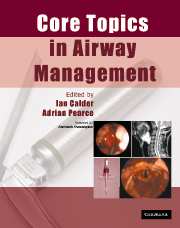Book contents
- Frontmatter
- Contents
- List of contributors
- Preface
- Acknowledgements
- List of abbreviations
- 1 Anatomy
- 2 Physiology of apnoea and hypoxia
- 3 Physics and physiology
- 4 Cleaning and disinfection of airway equipment
- 5 General principles
- 6 Maintenance of the airway during anaesthesia: supra-glottic devices
- 7 Tracheal tubes
- 8 Tracheal intubation of the adult patient
- 9 Confirmation of tracheal intubation
- 10 Extubation
- 11 Light-guided intubation: the trachlight
- 12 Fibreoptic intubation
- 13 Retrograde intubation
- 14 Endobronchial and double-lumen tubes, bronchial blockers
- 15 ‘Difficult airways’: causation and prediction
- 16 The paediatric airway
- 17 Obstructive sleep apnoea and anaesthesia
- 18 The airway in cervical trauma
- 19 The airway in cervical spine disease and surgery
- 20 The aspiration problem
- 21 The lost airway
- 22 Trauma to the airway
- 23 Airway mortality associated with anaesthesia and medico-legal aspects
- 24 ENT and maxillofacial surgery
- 25 Airway management in the ICU
- 26 The airway in obstetrics
- Index
5 - General principles
Published online by Cambridge University Press: 15 December 2009
- Frontmatter
- Contents
- List of contributors
- Preface
- Acknowledgements
- List of abbreviations
- 1 Anatomy
- 2 Physiology of apnoea and hypoxia
- 3 Physics and physiology
- 4 Cleaning and disinfection of airway equipment
- 5 General principles
- 6 Maintenance of the airway during anaesthesia: supra-glottic devices
- 7 Tracheal tubes
- 8 Tracheal intubation of the adult patient
- 9 Confirmation of tracheal intubation
- 10 Extubation
- 11 Light-guided intubation: the trachlight
- 12 Fibreoptic intubation
- 13 Retrograde intubation
- 14 Endobronchial and double-lumen tubes, bronchial blockers
- 15 ‘Difficult airways’: causation and prediction
- 16 The paediatric airway
- 17 Obstructive sleep apnoea and anaesthesia
- 18 The airway in cervical trauma
- 19 The airway in cervical spine disease and surgery
- 20 The aspiration problem
- 21 The lost airway
- 22 Trauma to the airway
- 23 Airway mortality associated with anaesthesia and medico-legal aspects
- 24 ENT and maxillofacial surgery
- 25 Airway management in the ICU
- 26 The airway in obstetrics
- Index
Summary
There are as many opinions as there are people: each has his own correct way
Terence ca. 190–159 BCThat may be right in theory, but it will not work in practice
From an essay title by Immanuel Kant 1793Serious problems with airway management are rare, but situations that have the potential to have a bad outcome are not uncommon. Most anaesthetists are exposed to a ‘just barely in control’ airway situation from time to time, and there is an element of becoming ‘sadder and wiser’ in many anaesthetic careers. Anaesthetists are increasingly exposed to legal action in the event of an unfavourable outcome. They are therefore inclined to adopt procedures that will be supported by a substantial majority of their peers, however because of the infrequency of serious airway problems it is difficult to compare one technique with another in a rigorous way and be certain of a ‘best buy’. Most techniques work in most situations. All will fail sometimes. We have no solid ‘evidence base’ to guide us. For instance, accepted canons of management such as the ‘rapid sequence induction’ (RSI) with cricoid pressure have never been subjected to a trial.
Most techniques require training and practice. It is hard both to obtain and provide training – and getting harder. Ethical constraints loom larger and larger and the trainee's time is increasingly at a premium. The advent of the laryngeal mask airway (LMA) has revolutionized anaesthesia, but it cannot be denied that most of us get less practice in mask anaesthesia and tracheal intubation than before its introduction.
- Type
- Chapter
- Information
- Core Topics in Airway Management , pp. 35 - 42Publisher: Cambridge University PressPrint publication year: 2005



